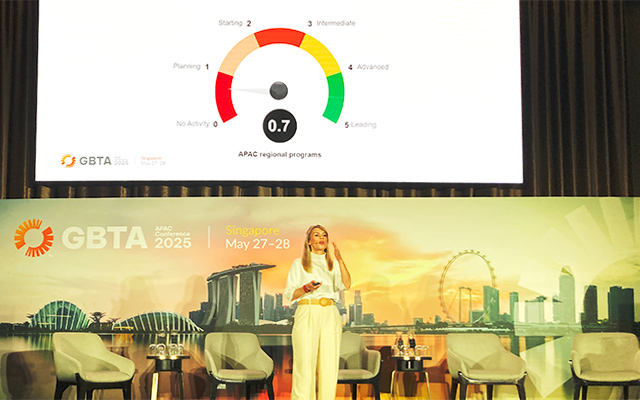Asia-Pacific (APAC) is trending well where 54 per cent of corporates have included sustainability considerations in their travel policy, with purposeful trips being the number one sustainability practice, according to a GBTA Foundation study.
Delphine Millot, senior vice president, sustainability and advocacy and managing director of the foundation, added 67 per cent of them have sustainability features integrated into their corporate travel booking platform.

She shared these findings during The Future of Decarbonised Travel Programmes session at the GBTA APAC Conference, held earlier this week in Singapore.
APAC is also closing the gap on emissions tracking and 59 per cent of companies are expected to track their business travel emissions by end-2025, a big jump compared to the 28 per cent polled in 2024.
Millot continued: “Companies are sending a stronger, harmonised demand signal to suppliers where 24 per cent include sustainability questions in their RFPs and 17 per cent use responses in their supplier selection.
“A new GBTA Sustainable Procurement Standards guide has been released to support this process.”
However, APAC’s average sustainability maturity score across four categories of business travel emissions management for regional programmes is only 0.7, compared to 1.3 for the average maturity score across four categories of business travel emissions management for all programmes.
The region, she noted, has the potential to outpace other regions.
Other findings show the bigger the size of the travel programme, the bigger the maturity score is. Leading sectors are finance, banking and insurance scoring 2.0, followed by 1.7 for consultancy and professional services and 1.5 for technology, telecoms and media.
Millot further commented business travel emissions are very visible to employees, especially to Gen Z travellers.
Eleven per cent of companies say they plan to buy SAF, four per cent have onboarded a carbon fee and eight per cent have a carbon budget, but she acknowledged that “cost is still the number one barrier”.
The study comprised 241 companies with global reach of all sizes, sectors and geographies with participation from 114 global, 54 APAC, 46 Americas and 27 EMEA respondents.
GBTA shared that the association will soon launch its GBTA Transition Pathway Guide, and GBTA SAF Corporate Connect.
Jim Crowder, global strategic sales, APAC, Enterprise Mobility, said the region’s 2023 travel spend by category for ground transportation was the highest at 40.8 per cent ahead of the Americas at 26.9 per cent, Europe at 26.5 per cent, Latin America at 3.7 per cent, and the Middle East/Africa at 2.1 per cent.
He added a recent small sample size poll showed 40 per cent of respondents did not have a ground transportation policy.
Buyer Amy Niu, travel manager Asia Pacific of Arcadis, shared that the infrastructure solutions company’s global programme was consolidated two years ago and its carbon budget, on top of its financial budget, was added in 2024.
Niu shared that Arcadis is part of KLM’s Corporate BioFuel Programme, committing to buy SAF for all its business flights.
She told delegates the company launched a “rail over air for trips under five hours” guide, “no more than two inter-continental trips a year” policy and where the first four modules of its sustainability training for employees is compulsory.





















